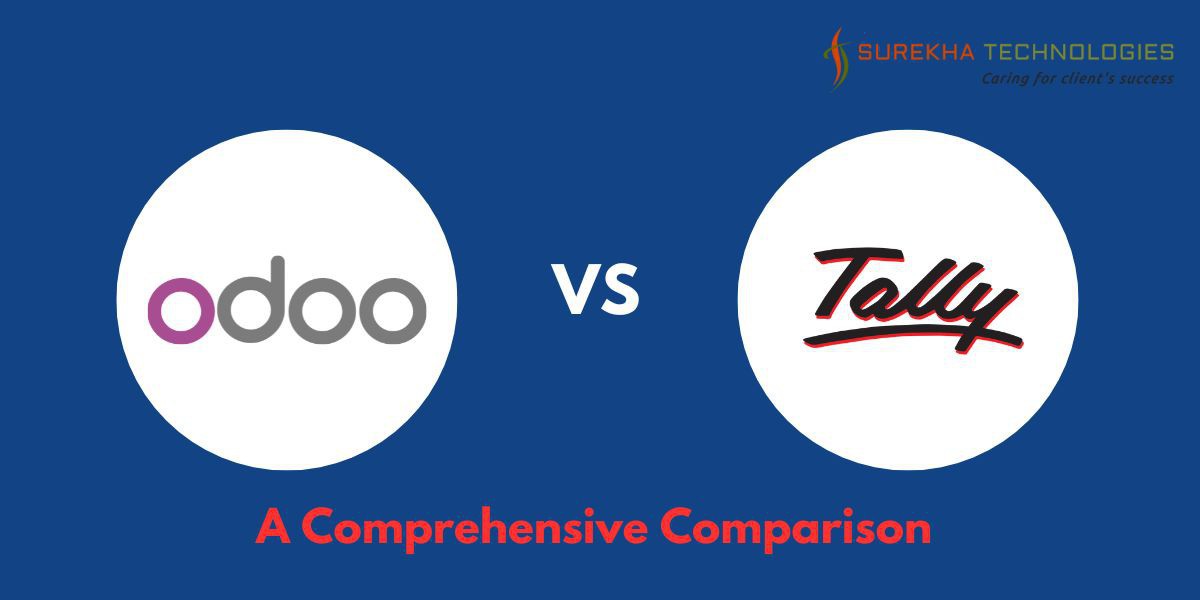When it comes to business management software, Odoo and Tally are two widely recognized platforms. Both have their unique strengths, but which one is the right choice for your business? To help you make an informed decision, this comparison will break down the key features, strengths, and weaknesses of both Odoo and Tally. We'll also explore how custom Odoo development and Odoo consulting services can help you make the most of Odoo’s flexibility, and how you can keep your Odoo system up to date by managing the Odoo update database effectively.
Overview of Odoo and Tally
Odoo
Odoo is an open-source enterprise resource planning (ERP) software that covers a wide array of business operations, from accounting to human resources, supply chain management, and CRM. It offers a modular structure, allowing businesses to pick and choose the features they need.
With over 35 modules available in its standard version and thousands of third-party apps, Odoo’s flexibility is unmatched. The software is available both as a free community version and as a paid enterprise version, offering advanced features and dedicated support.
Tally
Tally is an Indian-origin accounting software primarily known for its simple yet powerful accounting functions. While it excels at accounting, Tally also provides features for inventory management, payroll, taxation, and compliance. Unlike Odoo, Tally is not open-source, and customization options are limited. However, its ease of use and reliability make it a popular choice among small and medium-sized businesses in India and several other countries.
Feature Comparison
Accounting
Accounting is one of the core functionalities where Odoo and Tally diverge significantly.
- Odoo: Odoo’s accounting module is designed for global businesses. It supports multi-currency transactions, automated invoice generation, financial reporting, bank reconciliation, and more. With custom Odoo development, businesses can tailor their accounting features according to specific needs, such as integrating third-party financial software or automating complex tax calculations.
- Tally: Tally is primarily known for its accounting excellence. It’s a go-to solution for companies looking for straightforward, reliable accounting software. Tally offers multi-currency support, GST compliance, payroll management, and other accounting functions. While it’s easy to use for Indian tax regulations, it may lack the flexibility required by international businesses when compared to Odoo.
Winner: Odoo takes the lead for businesses requiring global compliance and advanced accounting features, while Tally wins for Indian businesses needing simplicity and GST compliance.
Customization
Customization is essential for businesses looking to align software with their unique processes.
- Odoo: One of the biggest advantages of Odoo is its customization capabilities. With custom Odoo development, businesses can modify modules or even build entirely new ones to meet specific requirements. Odoo consulting services can help businesses design, develop, and implement these customizations efficiently. Furthermore, Odoo’s open-source nature means that the system can evolve as the business grows, making it future-proof.
- Tally: Tally, on the other hand, is not known for its customization. While some customizations can be done using Tally’s TDL (Tally Definition Language), the options are limited compared to Odoo. Businesses that outgrow Tally often find it difficult to scale and add new functionalities without migrating to a different system.
Winner: Odoo is the clear winner when it comes to customization. Its open-source nature and modular structure allow for a highly customizable and scalable solution.
Modules and Features
Both Odoo and Tally offer a variety of features, but their focus areas are different.
- Odoo: Odoo’s modular structure is one of its standout features. Whether it's sales, CRM, inventory, HR, or project management, Odoo covers all aspects of business operations. This makes it an all-in-one ERP solution for businesses looking to integrate various departments into a single system. The platform also allows third-party app integrations, enhancing its functionalities even further. With the proper Odoo update database procedures, businesses can regularly introduce new modules and updates without any disruptions.
- Tally: Tally’s primary focus is on accounting, and while it does offer features for inventory, payroll, and taxation, it’s not designed to manage the broader operations of a business like Odoo. Tally is best for businesses whose primary need is accounting and financial management, without the need for extensive additional modules.
Winner: Odoo provides a more comprehensive set of modules, making it ideal for companies looking for an all-in-one business management platform. Tally is more specialized and best suited for businesses focusing primarily on accounting.
User Interface
Ease of use is an essential factor when choosing business management software.
- Odoo: Odoo’s user interface is modern, clean, and intuitive, making it easy for users to navigate through different modules. With Odoo consulting services, businesses can receive training and support to ensure that their teams are well-versed in the system. Furthermore, the interface can be customized, ensuring it aligns with the business’s operational structure.
- Tally: Tally’s interface is simple and straightforward but lacks the modern design that Odoo offers. It is designed for efficiency, particularly for accounting purposes, but it may feel outdated to users who are accustomed to more modern software platforms. However, its simplicity is one of the reasons it is widely popular among accountants.
Winner: Odoo wins in terms of user interface, offering a more modern and customizable experience.
Integration Capabilities
Modern businesses require software that can integrate with other systems for smoother operations.
- Odoo: Odoo excels in integration capabilities. It integrates seamlessly with a wide range of third-party applications, including payment gateways, eCommerce platforms, shipping services, and social media channels. Custom Odoo development can further expand integration possibilities, allowing businesses to connect with any software they require.
- Tally: Tally’s integration options are limited, especially compared to Odoo. While Tally can integrate with some banking and financial services, it doesn’t offer the same extensive integration capabilities. Businesses that rely on various digital tools might find this limiting.
Winner: Odoo is the superior choice for businesses that need extensive integration with other systems.
Pricing
Price is often a crucial factor for businesses, especially small and medium enterprises.
- Odoo: Odoo offers a free community version, which is an excellent option for small businesses or startups. The enterprise version, which comes with additional features and support, is priced based on the number of users and modules. This pricing structure can become expensive as businesses scale, but the value it provides makes it worth the investment.
- Tally: Tally offers a one-time purchase model, making it a more affordable option in the long run. Businesses pay for the software license and only need to pay for updates or additional features. This model is appealing for businesses that don’t want recurring subscription fees.
Winner: Tally is more affordable in terms of initial investment, but Odoo provides more value for businesses that need a comprehensive, scalable solution.
Which One Should You Choose?
The choice between Odoo and Tally largely depends on the specific needs of your business.
Choose Odoo if you are looking for a flexible, customizable, and scalable ERP solution that can manage every aspect of your business. Odoo consulting services and custom Odoo development make it possible to tailor the system to your needs, ensuring seamless integration and operations. Additionally, Odoo’s frequent updates managed through Odoo update database protocols, ensure that your system stays up-to-date with the latest features.
Choose Tally if you need simple, reliable accounting software and don’t require extensive customization or additional features. Tally is especially suitable for small to medium-sized businesses that need a straightforward, cost-effective solution for managing their accounting and compliance needs.
Conclusion
Both Odoo and Tally have their strengths, and the best choice depends on your business’s specific requirements. If you prioritize flexibility, customization, and a comprehensive range of modules, Odoo is the clear winner. With the help of Odoo consulting services and custom Odoo development, you can build a system that fits your business like a glove. For businesses focused on simplicity, cost-effectiveness, and accounting, Tally remains a solid option.
Whichever you choose, understanding the key differences between these two platforms is essential for making the right decision that will support your business growth.



